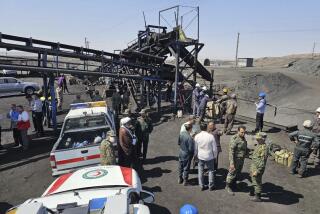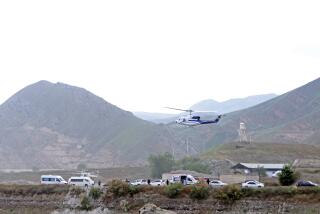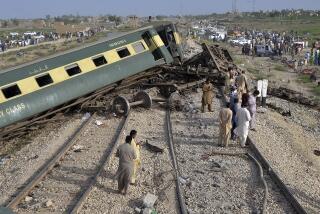Train crash in Iran kills at least 8
- Share via
Reporting from Beirut — A train accident in northeastern Iran killed at least eight people this morning and injured dozens, underscoring problems in Iran’s transportation sector.
Four wagons of a five-car passenger train traveling between the capital, Tehran, and the eastern city of Mashhad derailed near the town of Joghatay, 420 miles from the capital, shortly before 10:30 a.m. local time, Iranian news outlets reported.
A medical helicopter and 12 ambulances have been dispatched to the scene, and several of those injured remain in grave condition, Iranian news sources reported.
Gholam-Reza Masoumi, head of State Emergency Center, told the semi-official Iranian Labor News Agency, ILNA, that the death toll from the train accident is likely to rise “in view of the critical conditions of some casualties and the type of incident.”
News agencies said the four cars flipped over near a train station. A photograph posted to the website of Iran’s semi-official Fars news agency showed rescue workers climbing an overturned rail car on a field.
Officials cited by Iranian news agencies variously attributed the accident to a switch failure, the breaking of a pin, an obstacle on the tracks or the train traveling at too high a speed. But an official described as the deputy director of the state-owned rail company told ILNA no conclusions had yet been drawn.
Iran’s railway network connects its northwestern border with Turkey to its northeastern border with Turkmenistan, and its northern Caspian Sea to southern ports along the Persian Gulf. An Iranian company recently signed a deal to build a 200-mile rail line that would connect Iran’s rail network to those of Kazakhstan and Turkmenistan, according to Fars.
But experts say Iran’s transportation sector, especially civil aviation, has deteriorated over the last 30 years because of international sanctions, mismanagement and lack of investment.
Three people died last summer in a train accident along the same Tehran-Mashhad route. In 2004, a train loaded with chemicals and fertilizer exploded after an accident near the eastern city of Neyshapour, also along the same route, killing at least 300 local residents, including several top officials, in one of the worst industrial accidents in Iranian history.
The West has offered to lift sanctions and contribute to the rebuilding of Iran’s transportation sector if Tehran curbs sensitive aspects of its nuclear program, which the U.S. and Europe suspect is the cornerstone of an eventual weapons capability.
Iran insists its nuclear program is meant solely for peaceful civilian purposes and refuses to abide by United Nations Security Council resolutions calling on it to halt uranium enrichment. . China and Russia have resisted U.S. and European efforts to impose even harsher sanctions on Iran over its nuclear enrichment program.
More to Read
Sign up for Essential California
The most important California stories and recommendations in your inbox every morning.
You may occasionally receive promotional content from the Los Angeles Times.










